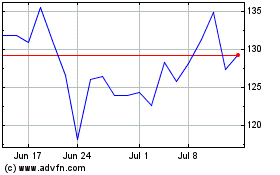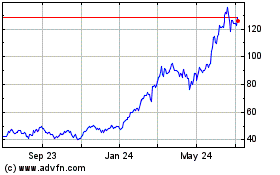Tech giants are hurriedly snapping up startups in the field of
artificial intelligence, with Intel Corp. the latest to join a
buying spree fueled by one of the hottest trends in the tech
sector.
The chip giant on Tuesday announced plans to pay an undisclosed
amount for Nervana Systems, a 48-employee company working on
semiconductors, software and services to exploit a popular AI
technique called deep learning.
Intel's move follows a deal disclosed Friday by Apple Inc. to
purchase Turi Inc., a Seattle-based specialist in the field. The
two acquisitions add to a string of 31 purchases since 2011 of AI
startups by large companies tallied by venture-capital research
firm CB Insights. The firm lists buyers that include Alphabet
Inc.'s Google, Twitter Inc., Yahoo Inc., International Business
Machines Corp. and Salesforce.com Inc.
Factoring in smaller acquirers, PricewaterhouseCoopers LLP
counts 29 related acquisitions so far this year, suggesting the
total deal count for 2016 will top the 37 deals announced last
year.
"We are on a very swift and increasing pace," said Todson Page,
the accounting and professional service firm's U.S. technology
industry deals leader.
Industry executives link the activity to the quickly widening
applications of AI, a broad term referring to ways to make
computers emulate attributes of the human brain. An initial cycle
of excitement about the technology arose in the 1980s and later
fizzled, but interest boomed in recent years due to breakthroughs
in the field known as machine learning, especially in the specific
area of deep learning.
Instead of programming machines explicitly to, say, recognize a
human face, deep learning allows computers to learn to perform the
task by analyzing vast troves of images of faces. Apple, for
instance, uses deep learning to analyze speech commands issued to
Siri, the software used for a variety of tasks on iPhones. Other
applications include detecting credit-card fraud, interpreting
medical images, studying crop growth, and enabling drones and
self-driving cars to navigate.
"AI is about to transform industry after industry," said Andrew
Ng, a deep-learning pioneer who is chief scientist at Baidu Inc.
and an associate professor at Stanford University.
Dollar figures for the AI acquisition binge are hard to come
by—as are figures for individual AI transactions—because the big
tech companies are swooping in on startups before they have built
market valuations of a size that buyers would be compelled to
disclose.
The buyers need talent more than technology, Mr. Ng said, since
today's AI products quickly will need to be updated. Google, which
led its peers with nine purchases, according to CB Insights, mined
the AI research community in 2013 by buying DNNresearch, a company
helmed by the influential University of Toronto AI researcher
Geoffrey Hinton.
The following year, Google bought DeepMind Technologies Ltd., a
London-based startup founded by Cambridge University graduates that
some publications pegged at a price tag of more than $400 million.
The DeepMind team developed AlphaGo, the AI software that made
headlines earlier this year by defeating a South Korean master of
the game Go.
Apple helped to ignite the recent consumer AI boom following its
2010 purchase of the startup Siri. In buying Turi, the company
stands to benefit from the expertise of Carlos Guestrin, who holds
a University of Washington machine learning professorship endowed
by Amazon.com Inc.
Industry executives say an array of other companies feel a need
counter AI results at younger companies like Google and Facebook
Inc.
"They are arming up," said Matt Ocko, a managing partner at the
venture-capital firm Data Collective, which invested in
Nervana.
The pressures are particularly acute on companies that manage
vast amounts of images or sounds, said Greg Papadopoulos, a venture
partner at New Enterprise Associates, an investor in Turi.
Companies that don't step up activity through acquisitions, he
said, soon will face serious competitive threats.
Intel has special motivations. While its Xeon chips handle most
computing tasks in data centers, rival Nvidia Corp. has popularized
chips known as graphics processing units, or GPUs, to more quickly
handle specialized chores associated with deep learning.
Nervana, which divides its staff between the California cities
of San Diego and Palo Alto, has AI software that exploits GPUs but
also expects to deliver a chip next year it says can complete deep
learning tasks even more quickly.
Jason Waxman, a corporate vice president in Intel's data-center
group, declined to say how it might use Nervana's chips. But Naveen
Rao, Nervana's chief executive and co-founder, said Intel had
unique manufacturing and technical expertise to help propagate the
startup's technology.
"No matter how much money we raised, we would not have access to
the same kind of technology as we will have at Intel," Mr. Rao
said.
Write to Don Clark at don.clark@wsj.com
(END) Dow Jones Newswires
August 09, 2016 16:25 ET (20:25 GMT)
Copyright (c) 2016 Dow Jones & Company, Inc.
NVIDIA (NASDAQ:NVDA)
Historical Stock Chart
From Mar 2024 to Apr 2024

NVIDIA (NASDAQ:NVDA)
Historical Stock Chart
From Apr 2023 to Apr 2024
